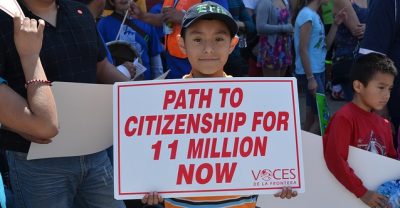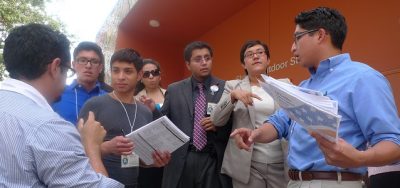Economic Impact
Immigrants are essential to the U.S. economy, filling roles from high-skilled tech sectors to agricultural labor and driving economic growth. They also contribute to the tax base and consumer spending. We champion reform that will maximize this effect and create a more diverse and competitive workforce.

Immigration Activists Take to the Streets in May Day Rallies Around the Nation
Tens of thousands of people across the country—from New York to Vermont to California and Arizona—gathered at rallies and marches yesterday to demand immigration reform. Immigrants and advocates joined with labor groups, lawmakers, and other organizations for the May Day, also known as International Worker’s Day, demonstrations in dozens of cities. And their message was clear: Congress must pass immigration reform. Read More

High-Skilled Immigration and Entrepreneurship in the Senate’s Immigration Bill
On the road to reform, the Senate’s Border Security, Economic Opportunity, and Immigration Modernization Act contains several changes and new provisions for skilled immigration and entrepreneurship. Specifically, the bill provides balanced reforms to the H-1B nonimmigrant visa for high-skilled individuals, various provisions for highly skilled individuals through permanent employment-based immigration, and a new INVEST visa for entrepreneurs. Read More

Senate Hearing Reinforces Why Congress Needs To Pass Comprehensive Immigration Reform
For more than seven hours on Monday, the Senate Judiciary Committee listened to testimony from almost two dozen people about the immigration reform bill a bipartisan group of senators introduced last week. From visas for farm workers and other foreign workers to the mandatory E-Verify system included in the bill, senators debated and questioned the witnesses about all aspects of immigration reform. Read More

Details Begin to Emerge on New Immigration Bill
Ahead of the expected release of a comprehensive immigration reform bill in the Senate this week, details were released outlining the broad strokes of the bill. The “Gang of Eight”—a bipartisan group of senators who have been working to develop the proposal—delayed a press conference that had been planned for today about the bill out of respect for the victims of the Boston Marathon bombing. The Senate group could announce the final measure tomorrow Read More

Why Are Some Still UnDACAmented?
The latest USCIS DACA numbers from March show that the agency has received roughly 470,000 applications, which means that just under half of those estimated to be eligible have applied. While the success reflected by the 470,000 figure is not to be downplayed, the new numbers beg the question: What about the other half million? Why are they still unDACAmented? Read More

Guaranteeing Access to Health Care to Immigrant Women: A Necessary and Wise Investment
In the current public debate regarding comprehensive immigration reform, the focus on immigrant access to health benefits has been almost exclusively limited to cost (which is undeniably an important aspect) and has rarely addressed the social gains that result from investing in a healthy population. For the most part, the health of immigrant women has been left out of the discussion, which is, in many aspects, problematic. Read More

The Pathway to Citizenship and Immigrant Integration: What Can We Learn from France and the United States?
As the 113th Congress engages in a historic debate on immigration reform, past attempts to overhaul immigration laws provide cautious reminders of the struggles and opportunities ahead in closing a deal on immigration policy. While the United States' own history is critical for understanding both the shortcomings and solutions of various policy arrangements, the experience of other receiving countries in dealing with immigration and immigrant integration also constitute an invaluable source of guiding lessons. By learning what effective policy solutions have been formulated in other countries to address issues such as the regularization of their undocumented population, the integration of newcomers, and the reception of asylees, to mention just a few – the United States can better and more strategically craft immigration policy and anticipate the impact of those policy changes. Read More

H-1B Visa Cap Reached in Five Days
U.S. Citizenship and Immigration Services (USCIS) announced on Friday, April 5, just five days after the H-1B high-skill “visa race” began, that they had received more applications than could be approved under the cap of 65,000 for fiscal year 2014. Additionally, USCIS stated they had received more than 20,000 H-1B petitions on behalf of individuals who are exempt from the cap. As such, USCIS will no longer be accepting additional H-1B petitions for fiscal year 2014. At this point, USCIS will use a random selection “lottery” process to allocate the 65,000 visas from the applications received through April 5. Read More

Nativist Group Releases Confusing Report on Legalization
The work of the nativist Center for Immigration Studies (CIS) is focused on grinding an anti-immigrant ideological axe, not on gathering evidence and employing rigorous analysis. A case in point is CIS’s recent report on the hypothetical cost of processing an “amnesty application.” It is difficult to discern what the point of the report actually is. It would seem to be that unauthorized immigrants are bad for the U.S. economy (which is false), and that legalizing them would offer no benefits for the U.S. economy (which is also false), so there shouldn’t be a new legalization program, but if there is going to be a new legalization program, it should be so expensive that lots of unauthorized immigrants can’t afford it, which would presumably leave a large unauthorized population in the United States, which would presumably still be bad for the U.S. economy. Needless to say, this is a rather convoluted analysis. Read More

Small Business Owners Support Comprehensive Immigration Reform
Small business owners throughout the United States have a pulse on the goings on within their local communities. They recognize that immigrant workers and their families are also consumers, which helps to create additional jobs and bolster local economies. Within that context, two new polls highlight small business owners’ perspectives of immigration and its positive effects on the ground in communities. Overwhelmingly, the surveys show small business owners, regardless of political affiliation, support comprehensive immigration reform. Read More
Make a contribution
Make a direct impact on the lives of immigrants.
